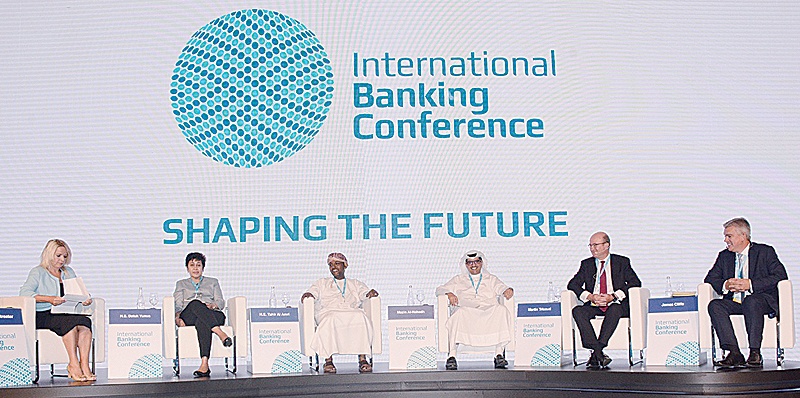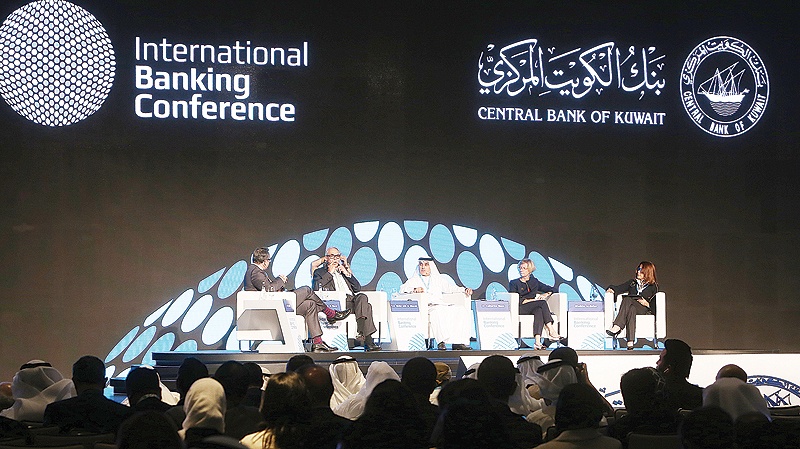

KUWAIT: Group Chief Executive Officer at Kuwait Finance House(KFH) Mazin Saad Al-Nahedh said that the banking and financial industry is undergoing a process of digital transformation where many processes - often transactional - are being fully automated.
He added during his participation in the CBK International Banking Conference, Shaping the Future: "We're living through a disruptive time where innovation is very strategic to competitive industries such as banking. Therefore, banks with competitive advantages will need to move faster to adapt to this ever-evolving environment given that the recent innovations are being adopted more quickly.


Today, many banks work in a fast-paced and competitive environment which challenges their current business models due to the Digitalization.
Al-Nahedh added during the discussion panel entitled Future Banking Models: What Lies Ahead, that to adapt to the fast-changing and competitive environment:
- Banks should partner with Fintech companies to keep upgrading their services while innovating new ones.
- Legacy systems should be replaced by using high-end systems that can match the increasing needs of enhancement.
- The change of mindset is significantly important. This can be achieved through hiring specialized personnel who promptly adapt change in efforts to avoid being left behind.
He pointed out that Kuwaiti banks are keen to invest in banking and financial technology and digital transformation. This trend will enhance the role of the private sector in the Kuwaiti economy as it is a key part of Kuwait's 2035 vision to become a regional financial and commercial hub.
Digital technologies enable shorter operational lead times, higher asset utilization and maximum product quality. Cost reductions of 3.8 percent per annum on average are forecasted.


KUWAIT: (From left to right), Moderator and Editor at Large Reuters Axel Threfall, and panelists Central Bank of Bahrain Governor Rasheed Mohammed Al-Maraj, CEO, Mashreq Group, UAE, Abdul Aziz Al-Ghurair, Global Chief Economist, Citibank, Dr Catherine Mann and Deputy Group CEO Shaikha Khaled Al-Bahar during the 'International Banking Conference: Shaping the Future' yesterday. --Photos by Yasser Al-Zayyat.
Digital innovation
In this context, I am pleased to say that Kuwait Finance House (KFH) is an undisputed leader in innovation to expand and enhance the range of products and services. KFH released the first fully automated 24hr digital self-service branches in Kuwait under the theme of KFH-Go and the first automated virtual queuing system for customers under the theme of Skiplino, showing the emphasis on convenience and higher levels of service quality, putting KFH at the forefront of innovation in the region as KFH taps into blockchain technology as an enabler for its growth
.
Al-Nahesh indicated: "digital disruptions are all around us. For example, Facebook, the world's largest media company, generates no content. Uber, the world's largest taxi company, owns no cars."
In such a mobile-first world, many financial institutions will gradually give up the traditional operating model to adopt a completely different one to remain relevant, in particular in two main segments: payments and financing.
Indeed, in a highly competitive market, the only thing that is permanent is change. The best Banks anticipate the need to evolve and adapt in a continuous cycle to the change in customer expectations especially when it comes to technological advancement.
He added: "In our region, banks have already begun the transition of adopting and utilizing the disruptive technologies. Many of these financial institutions are teaming up with financial services technology providers who own unique solutions and expertise in areas outside of the banks' traditional scope. They offer a range of services ranging from consultation, analysis and technical support to the creation of digital platforms and apps.
Across the MENA, the GCC countries made the most advances in adopting digital transformation. The digital economy accounts for 8.0 percent in Bahrain and 5.1 percent in Kuwait-but less than 1 percent in both Oman and Qatar. Bahrain's high score is mainly driven by that country's high digital exports to regional neighbors.
In Kuwait, digital innovation market (Smart services and software) is set to reach $989million (KWD 293 million). Kuwait vision 2035 is set to leverage digitalization.
At KFH level, we have some interesting figures to look at. The following figures reflect how KFH effectively utilizes these technologies to ensure that its business and customer expectations are aligned. In 2018, the total usage of KFH online services reached roughly 90 million. The number of registered KFH Online users reached over 450 thousand customers as of July 2019. New users signing up from January to July in 2018 reached 53 thousand, while it surged by 11 percent reaching 59 thousand for the same period in 2019.
These numbers confirm that we are on track and are adapting well to the digital era demands. Moreover, in KFH, we have embraced this change and introduced a wide range of high-end digital services over the past few years."
Al-Nahedh said that in the new digital phase, the banking industry has seen a shift in terms of customer preferences and behavior due to the rapid expansion of mobile and internet connectivity. New financial technology platforms and IT infrastructure have emerged to contribute to changing the traditional banking concept which keeps abreast of customers' experience.
Today, customers want relevant advice and product information at their fingertips as they go about their daily lives. As most customers want quick and easy access to service offerings, safety, security and fairness are now topping the list of their expectations. In our region, innovation is a primary driver for banks to meet the customer expectations and growth as well, where the overwhelming majority of population is young and highly tech savvy. Banks also could use it in the best interests of their customers.
Customers are at the center of the traditional banking industry being a service-oriented industry. The dynamic customer environment will without doubt have a direct impact.
To put matters in perspective, banks must determine customer needs and desires, focusing on the requirements that matter most to them, developing a comprehensive understanding of their needs and behaviors across segments and channels. The key is to use technology as a measuring tool to keep pace with changing customer needs. The flow of customer behavioral information should also be maintained in the bank's database.
Among areas that banks can focus on, is prioritizing improvement based on customer experience, expectations and operational cost. Given the rapid transformation, customers always expect faster, better, and safer services. Therefore, a continuous review of the key processes needs to be instituted. It should be a part of the bank's bi-annual or quarterly review.
He continued: "As the entire banking system evolves with the digitization agenda and gains access to new technologies, there is an opportunity for regulators to play a vital role to ensure banks achieve smooth business models' transformation. This needs to be driven by a supportive regulatory environment in which banks can operate, transform and innovate while ensuring that customers are protected."
He pointed out that there are several trends unfolding locally, regionally and even globally. The first trend is regulation, where the Central Bank of Kuwait issues the regulation for Electronic Payments to install much-needed discipline in the payments world.
Regulation
There is also regional regulation that has been issued, regulating token sales, Telco/banking licensing wallets..etc. The regulatory scene continues to be very high paced and very pivotal in determining the direction of the markets and more importantly in protecting consumers from loose technologies, this builds more trust and confidence in digital technology.
The regulatory authorities have played a partnership role as well as a supportive role with the banking sector since it is the lifeblood of the local economy. They have found a balance between allowing banks to utilize new technologies, and work towards transforming their operating models, while at the same time setting the guidelines that will protect the interests of all stakeholders (shareholders, customers, the public etc.).

